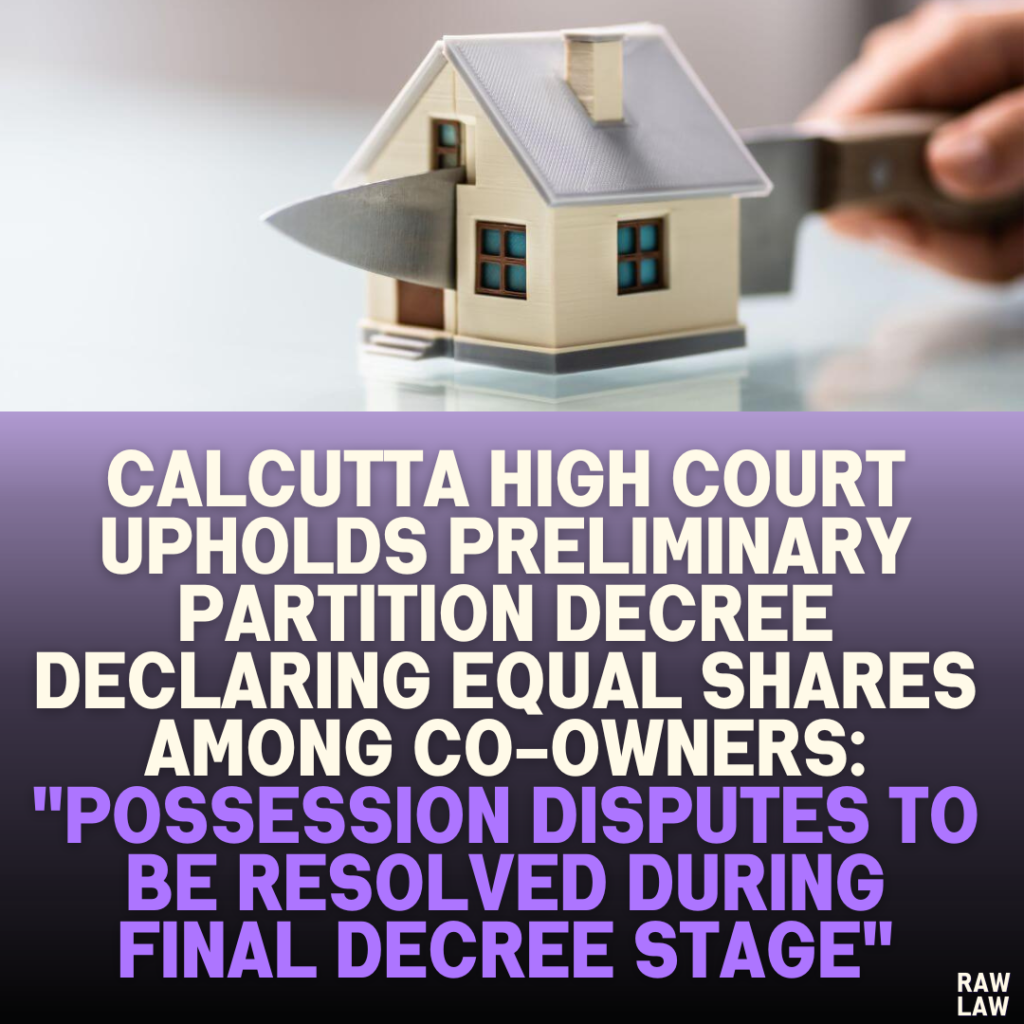Court’s Decision:
The Calcutta High Court dismissed the appellant’s challenge to the preliminary decree in a partition suit, which had declared equal shares for all co-owners. The court reaffirmed that disputes regarding possession or inequality of shares would be addressed during the final decree stage. It directed that evidence regarding the possession and allocation of shares could be presented before the Partition Commissioner and Trial Court during subsequent proceedings.
Facts of the Case:
- The appellant, a defendant in a partition suit, challenged a preliminary decree passed by the Trial Court declaring each party (the appellant and two respondents) entitled to a one-third share of the suit property.
- The appellant claimed to be in possession of a larger portion of the property and argued that the partition should consider this existing possession.
- The Trial Court issued a preliminary decree declaring equal shares among the parties without addressing the appellant’s claim of exclusive possession.
- The appellant contended that no credible evidence had been provided to demonstrate the equal ownership declared by the Trial Court.
Issues:
- Whether the appellant’s claim of exclusive possession over a significant portion of the suit property invalidates the preliminary decree.
- Whether the preliminary decree should have accounted for existing possession and any inequality in ownership before allocating shares.
Petitioner’s Arguments:
- The appellant argued that the records of rights supported their claim of exclusive possession of a substantial portion of the property.
- Claimed to have been in exclusive possession of a larger share of the property for over 12 years, although no documentary proof was provided to substantiate this assertion.
- Sought intervention from the High Court to modify the preliminary decree in light of these claims.
Respondent’s Arguments:
- The respondents denied the appellant’s claim of exclusive possession.
- Highlighted inconsistencies in the appellant’s statements, pointing out that in cross-examination, the appellant admitted to lacking any evidence to demonstrate exclusive possession of the suit property.
- Argued that the preliminary decree was properly issued and reflected the joint ownership of the parties.
Analysis of the Law:
- Partition Suits: Partition suits typically involve two stages:
- Preliminary Decree: Declares the respective shares of the co-owners without assigning physical possession or allocating specific portions of the property.
- Final Decree: Resolves disputes about possession and allocates specific portions of the property to each co-owner.
- The High Court clarified that preliminary decrees focus only on declaring ownership rights and are not the appropriate stage for resolving disputes over physical possession.
Precedent Analysis:
- The court adhered to established principles that emphasize resolving disputes about physical possession during the final decree stage rather than in the preliminary decree.
Court’s Reasoning:
- Joint Ownership Established: The court noted there was no dispute regarding the joint ownership of the suit property among the three parties, each having a one-third share.
- Premature to Address Possession Claims: The appellant’s claims of exclusive possession were deemed premature for consideration at the preliminary decree stage. The court stated that such issues should be addressed during the final decree proceedings.
- Partition Commissioner’s Role: The court emphasized that the Partition Commissioner and the Trial Court have the authority to consider the respective physical possession of the parties when allocating shares in the final decree.
Conclusion:
- The appeal was dismissed, affirming the preliminary decree issued by the Trial Court.
- The court directed that both parties could present evidence of their respective possession to the Partition Commissioner and the Trial Court during the final decree proceedings.
- Interim orders, if any, were vacated, and the Trial Court was instructed to expedite the case and aim to dispose of the matter by August 31, 2025.
Implications:
- The judgment reinforces that preliminary decrees in partition suits are limited to declaring ownership rights and cannot address possession disputes.
- It underscores the role of the Partition Commissioner and the Trial Court in ensuring equitable distribution during the final decree stage, allowing for disputes over possession to be fully examined.
- The decision promotes procedural clarity and ensures fairness in resolving disputes over joint properties.
